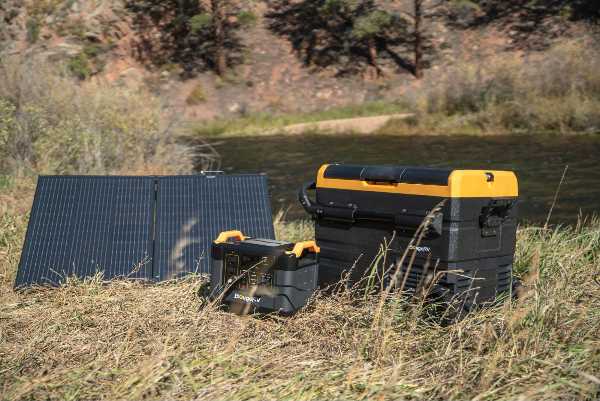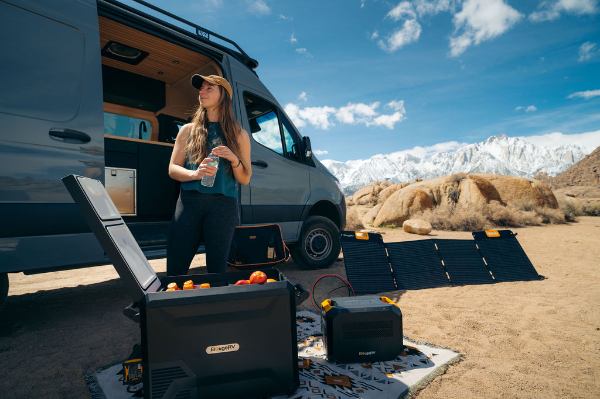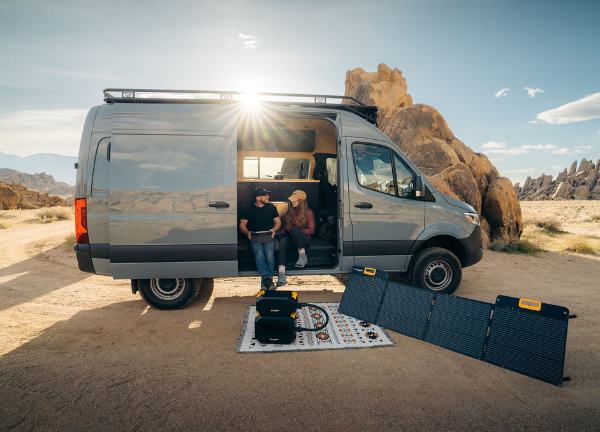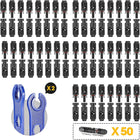Solar Generator for Refrigerator—Keep Your Food Fresh with the Power of the Sun!

A fridge is a must-have for keeping your food safe and your drinks chilled. However, what if the power goes out? Or perhaps you're living off the grid, camping, or just aiming to be kinder to the planet. The solution shines brightly in the sky every day—solar power. With a solar generator powering your fridge, you're looking at total energy freedom. You'll shrink that carbon footprint and, bonus – your eats and drinks stay cold even when the grid lets you down or you're exploring the great outdoors.
In this comprehensive blog, we'll explore the benefits and considerations of using a solar generator to keep your refrigerator running smoothly.
Solar Generators
Before diving into their applications for refrigerators, let's clarify what a solar generator is. Unlike traditional fuel-powered generators, a solar generator harnesses energy from the sun using photovoltaic panels, commonly known as solar panels. This clean, renewable energy is then stored in a high-capacity battery within the generator.
Many solar generators also include an inverter to convert stored DC power into AC power, which is required by most household appliances, including refrigerators.
Why Choose a Solar Generator for Your Refrigerator?

- Eco-Friendly Energy
Using solar power is a sustainable choice that helps reduce our reliance on fossil fuels. By choosing a solar generator, you are opting for a clean energy source that emits no greenhouse gases during operation.
- Quiet and Low Maintenance
Solar generators operate silently, unlike gas generators that can be quite loud and disruptive. They also require less maintenance since there are no moving parts involved, reducing the time and cost associated with upkeep.
- Emergency Preparedness
In the event of a power outage, having a solar generator can be a lifesaver. Keeping your food cold can prevent spoilage, save money, and maintain a source of nutrition until power is restored.
- Off-Grid Living and Recreation
For those who enjoy the RV lifestyle or have remote cabins, a solar generator is ideal. It allows you to run a refrigerator without needing a connection to the power grid.
What to Look For in a Solar Generator for Your Refrigerator

1. Capacity and Power Output
The size and efficiency of the solar generator are paramount. Check the watt-hours (Wh) or kilowatt-hours (kWh) rating of the battery; this indicates how much energy the generator can store. Also, look at the continuous power rating, measured in watts (W), to ensure it can handle the startup and running power requirements of your refrigerator.
2. Battery Type
Most modern solar generators use lithium-ion batteries due to their long life span, high energy density, and fast charging capabilities. Some models may use other types like lead-acid, but these tend to be heavier and have shorter lifespans.
3. Solar Panel Compatibility
The generator should be compatible with high-quality solar panels capable of efficiently converting sunlight into electrical energy. Ensure the solar input can handle the power your panels produce.
4. Portability
If you plan to move the generator between locations or take it on trips, consider its weight and whether it has handles or wheels for easier transport.
5. Additional Features
Look for features like multiple outlets, USB ports, charge controllers, and display screens for monitoring input and output. These can enhance the usability of your solar generator.
How to Size a Solar Generator for Your Refrigerator?

To determine the correct size for your solar generator, follow these 4 steps:
1. Check Your Refrigerator's Specs: Find out the starting (surge) wattage and running (rated) wattage of your refrigerator. This information is typically found in the user manual or on a label inside the fridge.
2. Calculate Energy Needs: Multiply the running wattage by the number of hours you expect the refrigerator to run each day to get daily energy consumption in watt-hours. Add a buffer to account for the surge in wattage and inefficiencies. Generally, a small 12V fridge uses less than 1kWh per day. Read more: How Much Electricity Does a Mini-Fridge Use?
3. Choose the Right Generator: Select a solar generator with a battery capacity that exceeds your calculated daily energy needs and one that can handle the surge wattage without tripping.
4. Match with Adequate Solar Panels: Ensure you have enough solar panels to recharge the generator's battery each day. The total wattage of your solar panels should be such that they can replenish the used energy during sunlight hours.
BougeRV’s Solar Generator for Refrigerator
BougeRV Solar Generator Fort 1500 1456Wh
- Capacity: 200W foldable solar panel & 1456Wh portable power station
- Battery Type: LiFePO4
- Additional Features: Multiple ports, LED Screen, Fast-charging feature, etc.
Despite its large capacity of 1456Wh, the BougeRV solar generator Fort is both compact and portable, allowing you to charge your fridge anywhere and anytime. The foldable solar panel is easy to set up and can be adjusted as needed. Moreover, with multiple outlets, it's truly a titan for powering your fridge and other devices at your campsite. Enjoy endless power and extended camping time with our Fort 1500! Learn more details about BougeRV LiFePO4 Solar Generator Fort 1500.
BougeRV LiFePO4 Solar Generator Fort 1000 1120Wh
- Capacity: 100W foldable solar panel & 1120Wh portable power station
- Battery Type: LiFePO4
- Additional Features: Multiple ports, LED Screen, Fast-charging feature, etc.
As robust as our solar generator Fort 1500, the Fort 1000 is smaller in capacity, yet it's more compact and affordable. It can power a 60W mini-fridge for up to 15 hours. Besides keeping your food cool, it can also run a CPAP machine, a coffee maker, a laptop, and phones—whether you're camping or dealing with a power outage. Equipped with a LiFePO4 battery and BMS system, it’s reliable and safe for powering your devices. Learn more details about BougeRV LiFePO4 Solar Generator Fort 1000.
Keeping Your Fridge Cool with a Solar Generator: Top Tips and Tricks
- Charge Before Use: Always start with a fully charged solar generator to maximize the available power.
- Energy Efficiency: Opt for an energy-efficient refrigerator, BougeRV’s small 12V fridges with ECO Mode, for example, to reduce the overall power consumption.
- Direct Sunlight: Position your solar panels where they will receive direct sunlight for the longest part of the day.
- Regular Maintenance: Keep both the solar panels and generator clean and free from debris to ensure optimal performance.
- Monitor Usage: Use the display screen or a separate energy monitor to keep tabs on energy usage and remaining battery capacity.
Final Thoughts
A solar generator can be a game-changer if you are looking to power a refrigerator without relying on the traditional power grid. It offers a greener, quieter, and often more convenient alternative to conventional generators.
Whether you're preparing for emergencies, reducing your carbon footprint, or powering a remote cabin or RV, a solar generator provides peace of mind and keeps your edibles preserved with the abundant energy of the sun.
When selecting a solar generator, consider all the factors mentioned above to find the best fit for your specific refrigeration needs. So why wait? It's time to make the bright decision for your refrigeration needs and switch to a solar generator today!















































































































































































































